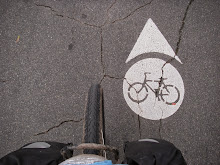The recent acrimony displayed by some of the Seattle Times' columnists on the issues of increasing transportation choices for Seattlites is appalling.
The development of a special tax improvement district (TID) should not be misleadingly framed as 'police versus pedestrians' argument.TID's are not police versus peds, it is not bikes versus cars, this TID is Seattle united against congestion and pollution and for increasing public liveability. That Seattle would even consider a TID is our city admitting we have a problem with pedestrian and cyclist unfriendly streetscapes that can be improved.
Tax improvement districts that earmark funds for active transportation projects have been cleared by the governor and state legislature as appropriate and timely to fund needed projects that drives cities out from under the toxic cloud of our current transportation model.
At the Federal level, the US Department of Transportation has also shifted official federal policy. New transportation directives REQUIRE cities and states to more equitably treat all modes of transportation, not just private motoring and freight, in the development of transportation infrastructure.
State and federal transportation officials endorse the shift in the transportation modality of the country, SDOT has positive plans for Seattle. Why are Seattlites are stuck sucking on the tailpipe of provincialist denial?
Joni Balter's column ignores the benefits Seattle or any city can reap for its citizens quality of life from encouraging a shift towards more active transportation. A move towards making it easier for Seattlites to get around under their own power and enjoy outdoor activities along public thoroughfares will have positive effects on:
Senior mobility, endemic obesity, childhood onset diabetes, air quality, water pollution in the sound (the largest polluter of Puget Sound is the private automobile), and intangible increases in quality of life. In the long run this shift to a liveable city will pay back to Seattle thru decreases in expenditures related to these serious and chronic social ills.
This is not a question of police or pedestrians. Seattle cannot continue the provincial denial of how to create a more liveable, walkable, active Seattle. This special tax improvement district should be met with laudatory approval by the Seattle Times and its columnists, not derision.

